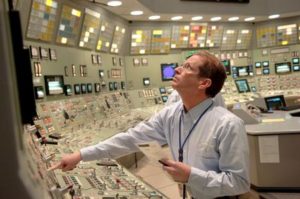 Purpose
Purpose
The course is to equip Cargo Control Room Operators with various sessions of cargo transfer via Ship to Ship Transfer operations and to deal with emergencies related to STS operations.
Cargo Control room operator is first on-scene in-charge of the FPSO Cargo operations and his immediate and appropriate response is critical in minimizing the damage or saving the situation.
Target Audience
Mariners / Navigating officers who would like to settle in FPSO as Cargo Supervisor or Cargo Control Room operator
Course Content
At its core, an FPSO facilitates the processing and storage of oil and gas at sea.
It stands for floating production storage and offloading (FPSO). These vessels are used extensively by the offshore industry and have become one of the primary methods of oil and gas processing and storage.
The vessels themselves are equipped with processing equipment for the separation, storage and offloading of oil and gas that comes from sub-sea oil wells or platforms. When oil and gas is processed, it is safely stored in the FPSO until it can be offloaded onto a tanker or a pipeline for transportation ashore.
- Production – The “P” in FPSO is what separates these vessels from FSOs. Production refers to the processing of oil and gas. Hydrocarbons are produced in seabed wells and this is transported to the FPSO via flowlines and risers. The hydrocarbons are then separated into oil, gas, water and impurities via the production facilities on the deck of the FPSO.
- Flowlines – Flowlines carry hydrocarbons directly from seabed well. These can be flexible or rigid.
- Risers – Developed for vertical transportation. This is the section of the line from the seabed to the topside.
- Storage – Once the oil has been processed, it is transferred to cargo tanks in the double hull of the vessel.
- Offloading – Offloading refers to transferring the gathered contents to additional transfer conduits. Crude oil that is stored in the vessel is then transferred to tankers and pipelines heading ashore. Gas is either transported to the shore via pipeline or recycled back into the field to increase production.
1 Introduction to FPSO cargo control room operator course
1.1 FPSO
1.2 International regulations concerning FPSO
2 Basic properties of petroleum and its hazards
2.1 Basic physics-revision
2.2 Properties of petroleum
2.3 Hazards associated with the handling and carriage of petroleum
Toxicity in general
Toxicity of petroleum
Toxicity of insert gas
Oxygen deficiency
Flammability and explosiveness
Electrostatic hazards
Hazards to the marine environment
3 Safety
3.1 General precautions
3.2 Entry into enclosed spaces
3.3 Precautions against electrostatic hazards
3.4 Gas indicators
3.5 Fire-fighting principles – revision
3.6 Protective equipment
4 Pollution prevention
4.1 Ship and equipment
4.2 Operational pollution
4.3 Oil Record Book
4.4 Action in case of oil spills
4.5 Air pollution
5 Oil tanker design and equipment
5.1 Constriction
5.2 Pumping, piping and discharge arrangements
5.3 Cargo heating system
5.4 Venting arrangements
5.5 Level gauges
5.6 Environmental protection equipment
6 Oil tanker operation
6.1 General precautions
6.2 Loading and discharging operation *
6.3 Ballasting and de ballasting *
6.4 Tank cleaning
6.5 Slop-tank operations
6.6 Purging and gas-freeing *
6.7 Ship\shore liaison
7 Cargo and ballast pumps
7.1 Pump theory and characteristics
7.2 Pressure surge
8 Emergency procedures
8.1 Emergency plan
8.2 Emergency alarms
8.3 Emergency organization
8.4 Action on discovering an emergency
9. Inert Gas Systems (IGS)
9.1 General
9.2 The inert gas system
9.3 Inert gas plant
9.4 Scrubber, inet gas blowers, inert gas pressure-regulating valves
9.5 Non-return devices
9.6 Inert-gas distribution and venting
9.7 Gas-analyzing and indicating equipment
9.8 Operation
9.9 Maters, indicators and alarms
9.10 Emergency procedures
9.11 Maintenance and testing
10. Crude Oil Washing (COW)
10.1 Introduction
10.2 Design of COW systems
10.3 COW piping
10.4 Tank washing machines
10.5 Pumps
10.6 Stripping systems
10.7 Operations
Course Fee INR Duration Course Timing Date Commence Remarks
CRO 40,000 2 Days
10:00-18:00 On Demand
